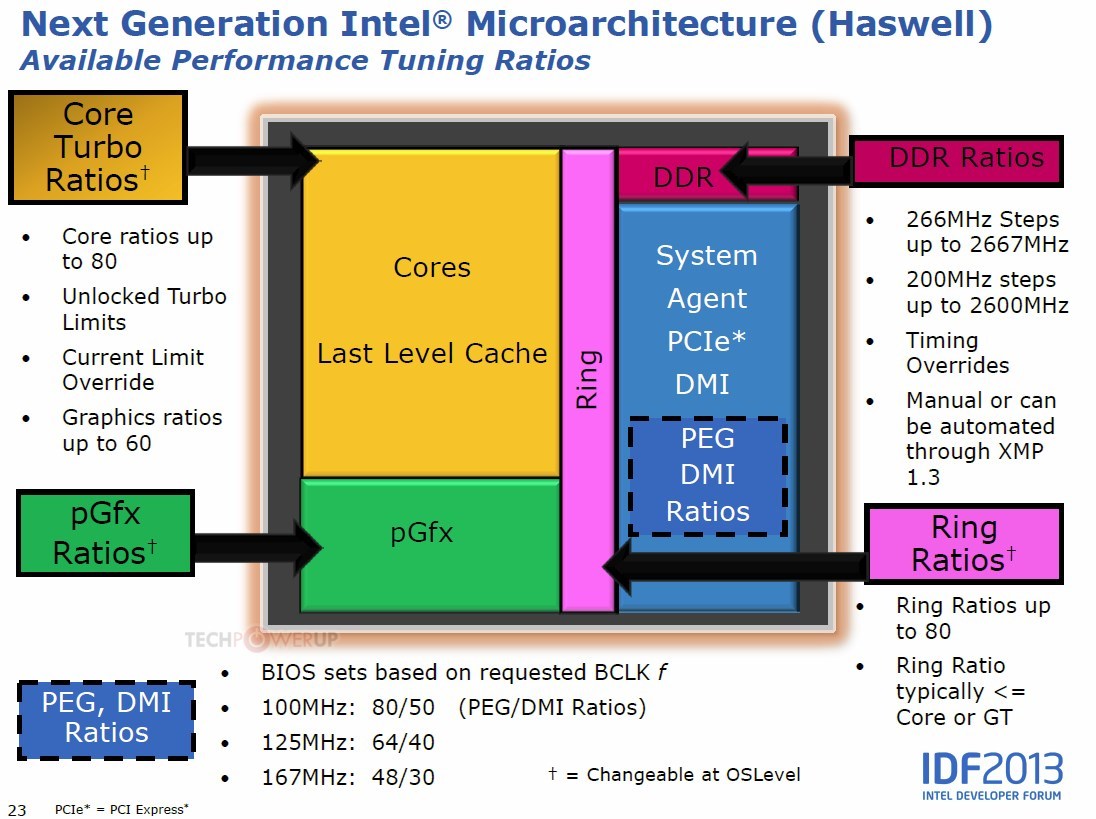Haswell CPUs Could Be Easier to Overclock
During IDF in Beijing Intel announced that its CPUs would become significantly simpler to overclock.
Intel has announced that the Haswell series of CPUs would be a lot easier to overclock. Like previous generations, the chips would feature a base clock frequency of 100 MHz, however, on Haswell CPUs users will be able to change this depending on the model.
Previously, the base frequency would also be applicable to the other modules in the chip, such as the memory controller. The problem with that system is that a deviation of just 7 MHz would destabilize some of the other controllers, even though the processor would keep working fine.
Consequently, Intel has thought to let owners of '-K' series CPUs change the base clock frequency to values such as 125 MHz or 166 MHz, while the other modules such as the memory controller would still run on a base clock of 100 MHz. Non '-K' series CPUs would likely not have an unlocked base clock modifier, even though in the past users could overclock non '-K' series CPUs through altering the base clock without touching the multiplier.
Back to the present, the maximum multiplier value tied to a 100 MHz base clock will be 80x, and the maximum would be lower for the other base clocks. For example, the maximum multiplier for a 125 MHz base clock would be 64x, and the maximum for a 166 MHz base clock would be 48x. Either way, in all three cases the maximum CPU frequency would be no higher than 8.0 GHz.
It will be interesting to see if these changes will actually yield in higher overclocks.
Contact Us for News Tips, Corrections and Feedback
Get Tom's Hardware's best news and in-depth reviews, straight to your inbox.
Niels Broekhuijsen is a Contributing Writer for Tom's Hardware US. He reviews cases, water cooling and pc builds.
-
aramisathei Maybe I'm missing something, but how is this any better than just using the core multiplier?Reply -
fil1p This sounds pretty good, I just hope that they use flux-less solder rather than thermal paste between the chip and the IHS. At least on the K series of CPU's, after all they are aimed at overclockers.Reply -
signothorn O/C is easy on my sandy bridge 2600k, I press a button and it overclocks the CPU and ram 20% on my Asus mobo. Haswell is going to be easier than that?Reply -
slomo4sho Easier? How does more complexity equate to being easier? One could assert that you can have greater success through the manipulation of two variables than just a single variable but I am not seeing how this equates to an easier overclock...Reply -
ihog Overclocking is simple enough as it is for Sandy/Ivy Bridge; what we want is better overclocking ability/potential.Reply -
InvalidError Reply
If Intel had surprise success with improving timing margins to provide 1GHz higher average clock yield, they would simply launch a product lineup with most of that 1GHz factored in.10672879 said:Overclocking is simple enough as it is for Sandy/Ivy Bridge; what we want is better overclocking ability/potential.
With multipliers locked across all lower-end models, Intel ensures that overclocking headroom remains relatively modest compared to what it used to be when most low/mid-range chips were still overclockable by at least 33% by simply changing FSB clock ratio. -
basketcase87 Reply
You're doing it wrong.10672749 said:O/C is easy on my sandy bridge 2600k, I press a button and it overclocks the CPU and ram 20% on my Asus mobo. Haswell is going to be easier than that?

